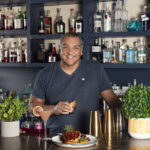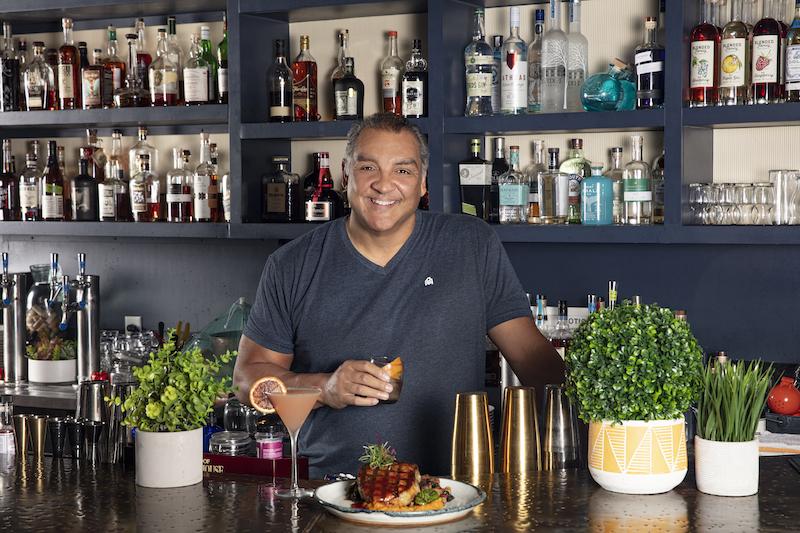One of Hilton Head Island’s more popular restaurants returned to the Eating and Liking grid last spring. Lucky Rooster Kitchen + Bar re-opened after a nearly year-long COVID-induced shutdown in 2020. Ultimately, the concept was sold by founder/creator Clayton Rollison and picked up by Hilton Head Island resident and veteran F&B presence David Leffew.
Lucky Rooster Kitchen + Bar, with new executive chef David Landrigan, returned to action in April just before the RBC Heritage golf tournament. That burst of energy bled right into the busy summer season.
Now that the dust has settled a bit, we caught up with Mr. Leffew to discuss the acquisition, the vision for the brand going forward, and what you can expect on your next visit.
Jesse Blanco: So how is it going so far?
David Leffew: Taking over a restaurant with such a great reputation as Lucky Rooster with seven years to perfect their craft, the biggest thing is that you’re coming in starting your operation over. You really have to focus on customer quality a lot more than maybe a brand-new restaurant with a brand-new name. There’s a challenge in taking on a concept—something that’s very popular in the community. My belief is that every customer we bring in today will bring us 10 more customers.
JB: What is your background with restaurants?
DL: I’ve actually been on the corporate side. While this is my first private ownership of a restaurant, I have over 20 years of hospitality experience, including seven years here on the island with the Sonesta Resort as the director of food and beverage.
JB: So, you were familiar with the turf, obviously.
DL: Yes. I was familiar with the community, very involved. I knew Clayton very well. We worked together on a number of projects—always considered him a friend. When COVID hit, our positions were eliminated. It obviously impacted this restaurant, and I was able to make a decision to purchase Lucky Rooster.
JB: Had you always wanted to own your own place, or did this come up when everything came together last year?
DL: It’s funny; everyone tells me I could think of a million other places to invest money instead of in a restaurant. I run them every day, and I know how difficult it can be. I think a great deal of what was on my mind wasn’t about buying a restaurant; it was about buying Lucky Rooster. I believed in what this stood for. I believed in the dining experience and the amazing craft cocktail program, and I believed there was a spot for it on Hilton Head and we could bring this back. If it was just any restaurant with a different name on it, I don’t know that I would have purchased it. We knew that this should keep going.
JB: Every chef has a vision for a menu. Did you share your vision with David on what you’d like to see going forward or did you let David create it?
DL: It was very important for me that Chef David Landrigan create his own menu. Out of respect for what Clayton had done, we wanted to make sure we differentiated menus. Clayton was a wonderful chef/owner, and his food was his food, but we knew it would be different. Without Clayton here, we weren’t going to try to do his food. He’s an extremely talented chef. Chef David is just as talented but there are differences in their upbringings and where they were trained. Our commitment, though, is the same: great food with Southern inspiration prepared properly every day.
JB: What would you say are your two most popular dishes right now?
DL: Our sales numbers will tell you that our two most popular are the Lucky Burger and the Steak Frites—delicious au poivre that David creates for the steak served with duck fat fries.
JB: When you are walking through here and you’re hungry, what are you looking for?
DL: So many options. I’m always looking for that ribeye. We have a commitment to quality, so we get our beef from Painted Hills Farms—grass-fed, hormone free, delicious—seared on cast iron with compound butter. That’s the thing that I’m always craving here. But really, any of the stuff on the menu is good. For the summer, we knew what we had to do to handle the volume. We went with an all-day menu—created some sandwiches because we knew it had to be done. Now, we will be able to move those to a lunch menu and create a more seasonal-specific dinner menu.
JB: How would you describe the clientele on this island?
DL: When we were talking about what we wanted this to be, we wanted it to be like something you’d find in Nashville or in Charleston—a little more of an urban vibe because it is something that is lacking on this island. There’s fine dining on this island. There are spots for waterfront. We didn’t want to be in any classification of “fine dining” or “casual dining.” What I want is the customer to be confused. The music is a little louder. The vibe is a little more casual, but the execution of the food is going to be more on the fine-dining level. When customers ask, “What is Lucky Rooster?” I want people to say, “I don’t know, but it was amazing, and I want to go back.”




